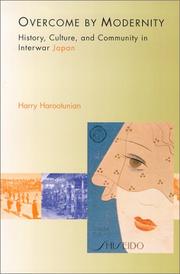| Listing 1 - 3 of 3 |
Sort by
|
Book
ISBN: 9062657303 9789062657308 Year: 1995 Publisher: Amsterdam In de Knipscheer
Abstract | Keywords | Export | Availability | Bookmark
 Loading...
Loading...Choose an application
- Reference Manager
- EndNote
- RefWorks (Direct export to RefWorks)
Aan de hand van de ervaringen van drie Japanners wordt een beeld geschetst van de ontwikkelingen in Japan in de laatste zestig jaar.
J4000.80 --- J4140.80 --- J3381 --- Japan: Social history, history of civilization -- Gendai (1926- ), Shōwa period, 20th century --- Japan: Sociology and anthropology -- cultural history -- Gendai (1926- ), Shōwa period, 20th century --- Japan: History -- Gendai, modern -- Shōwa period (1926-1989) --- J4150.80

ISBN: 0691095485 0691006504 1400823862 1283339722 9786613339720 1400814324 9780691095486 9781400823864 9780691006505 9781400814329 140081636X Year: 2000 Publisher: Princeton: Princeton university press,
Abstract | Keywords | Export | Availability | Bookmark
 Loading...
Loading...Choose an application
- Reference Manager
- EndNote
- RefWorks (Direct export to RefWorks)
In the decades between the two World Wars, Japan made a dramatic entry into the modern age, expanding its capital industries and urbanizing so quickly as to rival many long-standing Western industrial societies. How the Japanese made sense of the sudden transformation and the subsequent rise of mass culture is the focus of Harry Harootunian's fascinating inquiry into the problems of modernity. Here he examines the work of a generation of Japanese intellectuals who, like their European counterparts, saw modernity as a spectacle of ceaseless change that uprooted the dominant historical culture from its fixed values and substituted a culture based on fantasy and desire. Harootunian not only explains why the Japanese valued philosophical understandings of these events, often over sociological or empirical explanations, but also locates Japan's experience of modernity within a larger global process marked by both modernism and fascism. What caught the attention of Japanese thinkers was how the production of desire actually threatened historical culture. These intellectuals sought to "overcome" the materialism and consumerism associated with the West, particularly the United States. They proposed versions of a modernity rooted in cultural authenticity and aimed at infusing meaning into everyday life, whether through art, memory, or community. Harootunian traces these ideas in the works of Yanagita Kunio, Tosaka Jun, Gonda Yasunosuke, and Kon Wajiro, among others, and relates their arguments to those of such European writers as George Simmel, Siegfried Kracauer, Walter Benjamin, and Georges Bataille. Harootunian shows that Japanese and European intellectuals shared many of the same concerns, and also stresses that neither Japan's involvement with fascism nor its late entry into the capitalist, industrial scene should cause historians to view its experience of modernity as an oddity.
J4140.80 --- J4000.80 --- J3375 --- J3382 --- Japan: Sociology and anthropology -- cultural history -- Gendai (1926- ), Shōwa period, 20th century --- Japan: Social history, history of civilization -- Gendai (1926- ), Shōwa period, 20th century --- Japan: History -- Kindai, modern -- Taishō period (1912-1926) --- Japan: History -- Gendai, modern -- early Shōwa, prewar period (1920s-1945) --- Civilization, Modern --- Japan --- Civilization --- Western influences. --- Relations. --- Relations --- Occidental influences --- Twentieth century --- J4150.80 --- International relations --- Economic History --- Western influences --- Civilization - Western influences

ISBN: 076560082X Year: 1998 Publisher: Armonk, N.Y. Sharpe
Abstract | Keywords | Export | Availability | Bookmark
 Loading...
Loading...Choose an application
- Reference Manager
- EndNote
- RefWorks (Direct export to RefWorks)
National movements --- Sociology of culture --- Japan --- J4000.80 --- J4140.80 --- J4100 --- Japan: Social history, history of civilization -- Gendai (1926- ), Shōwa period, 20th century --- Japan: Sociology and anthropology -- cultural history -- Gendai (1926- ), Shōwa period, 20th century --- Japan: Sociology, anthropology and culture in general --- Japan. --- Nihon --- Nippon --- Iapōnia --- Zhāpān --- I︠A︡ponii︠a︡ --- Yapan --- Japon --- Japão --- Japam --- Mư̄ang Yīpun --- Prathēt Yīpun --- Yīpun --- Jih-pen --- Riben --- Government of Japan --- 日本 --- 日本国 --- Nipponkoku --- Nippon-koku --- Nihonkoku --- Nihon-koku --- State of Japan --- Япония --- Japani --- اليابان --- al-Yābān --- يابان --- Yābān --- Japonsko --- Giappone --- Japonia --- Japonya --- J4150.80 --- Jepun --- Yapon --- Yapon Ulus --- I︠A︡pon --- Япон --- I︠A︡pon Uls --- Япон Улс
| Listing 1 - 3 of 3 |
Sort by
|

 Search
Search Feedback
Feedback About UniCat
About UniCat  Help
Help News
News